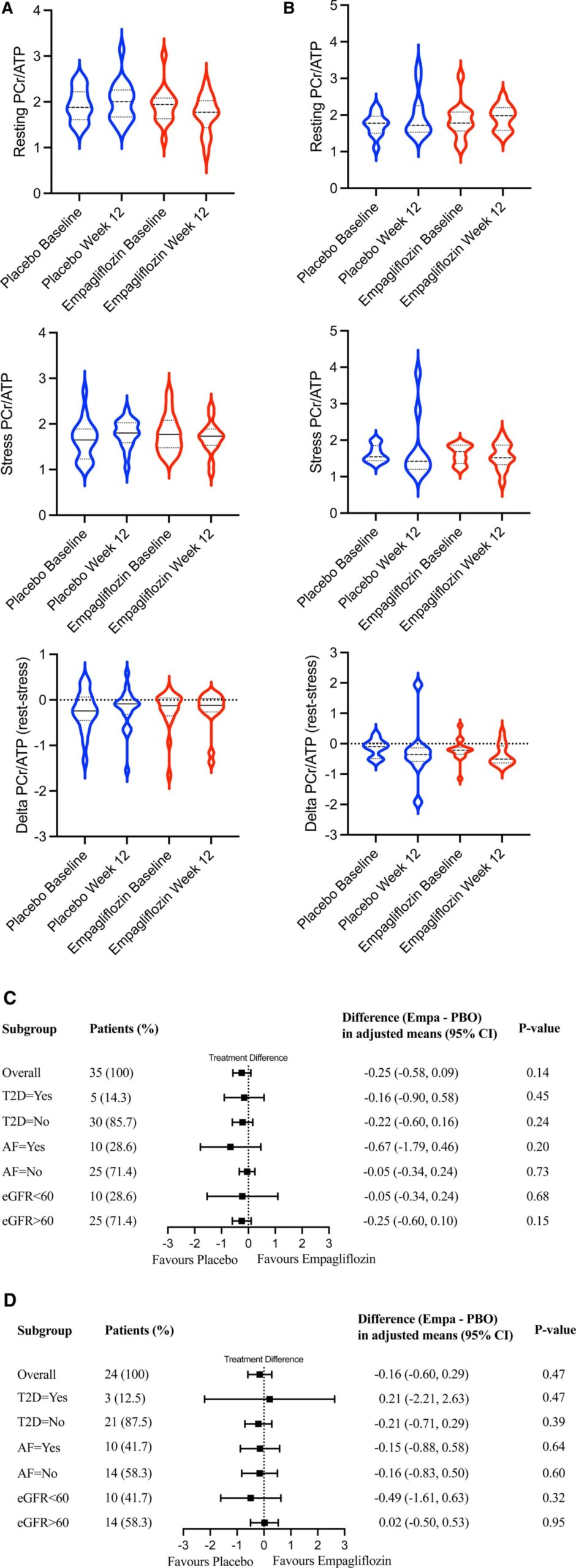Assessment of cardiac and skeletal muscle energy metabolism in clinical trials for efficacy of treatments for patients with heart failure, or long COVID patients
Investigator: Ladislav Valkovič, Ústav merania, v. v. i., SAV
Our non-invasive methods for energy metabolism assessment using phosphorus MR spectrscopy are ideal for treatment testing in patients, where cardaic or skeletal muscle metabolism is impaired.
Hence in collaboration with Boeringer Ingelheim, we have tested the potential mecahnism of effect of their new sodium-glucose co-transporter inhibitor drug (empagliflozin), which is one of the new superdrugs in treatment of hart failure. In total, we have recruited 72 patients with heart failure and measured their cardiac energetics pre and post 3 months of empagliflozin or placebo intake. And while we were not ablo to prove the effect of empagliflozin on cardiac energetics, we showed that patients taking empagliflozin felat better than those on placebo, proving the efficcacy of this drug.
Similarly, together with Axcella Therapeutics, we have investigated the efficacy of their new drug AXA1125 for improvement of muslce energy metabolism in patients suffering from long-COVID. In a group of 40 patients, we demonstrated that in those where the drug improved symptoms, the muscle oxidative metabolism also improved.

Fig. 1 Cardiac energetics (PCr/ATP) defined by phosphorus MR spectroscopy violin plots (including median and interquartile range) for the placebo and the empagliflozin treatment groups at baseline and 12 weeks after the respective treatment. PCr/ATP remained unchanged in both HFrEF (A) and HFpEF (B) after 12 weeks of empagliflozin treatment at rest (top row) and during dobutamine stress (bottom row), with 65% of age-maximum heart rate (ie, 220-age).
Projects: APVV-15-0029, VEGA 2/0003/20
Foreign partner: Oxford Centre for Clinical Magnetic Resonance Research, John Radcliffe Hospital, Headington, Oxford, UK
Scientific cooperation agreement signed 14. X. 2021
Publications 2023:
- FARRANT, J. – DODD, S. – VAUGHAN, C. – REID, A. – SCHMITT, M. – GARRATT, C. – AKHTAR, M. – MAHMOD, M. – NEUBAUER, S. – COOPER, R.M. – PRASAD, S.K. – SINGH, A. – VALKOVIČ, Ladislav – RAMAN, B. – ASHKIR, Z. – CLAYTON, D. – BAROJA, O. – DURAN, B. – SPOWART, C. – BEDSON, E. – NAISH, J.H. – HARRINGTON, C. – MILLER, C.A. Rationale and design of a randomised trial of trientine in patients with hypertrophic cardiomyopathy. In Heart, 2023, vol. 109, no. 15, p. 1175-1182. ISSN 1355-6037. (5.7 – IF2022) Q1
- FINNIGAN, L.E.M. – CASSAR, M.P. – KOZIEL, M.J. – PRADINES, J. – LAMLUM, H. – AZER, K. – KIRBY, D. – MONTGOMERY, H. – NEUBAUER, S. – VALKOVIČ*, Ladislav – RAMAN*, B. Efficacy and tolerability of an endogenous metabolic modulator (AXA1125) in fatigue-predominant long COVID: A single-centre, double-blind, randomised controlled phase 2a pilot study. In eClinicalMedicine, 2023, vol. 59, art. no. 101946. ISSN 2589-5370. (15.1 – IF2022) Q1
- HUNDERTMARK, M.J. – ADLER, A. – ANTONIADES, C. – COLEMAN, R. – GRIFFIN, J.L. – HOLMAN, R.R. – LAMLUM, H. – LEE, J. – MASSEY, D. – MILLER, J.J.J.J. – MILTON, J.E. – MONGA, S. – MÓZES, F.E. – NAZEER, A. – RAMAN, B. – RIDER, O. – RODGERS, C.T. – VALKOVIČ, Ladislav – WICKS, E. – MAHMOD, M. – NEUBAUER, S. Assessment of cardiac energy metabolism, function, and physiology in patients with heart failure taking empagliflozin: The randomized, controlled EMPA-VISION trial. In Circulation, 2023, vol. 147, no. 22, p. 1654-1669. ISSN 0009-7322. (37.8 – IF2022) Q1
- WATSON, W.D. – GREEN, P.G. – LEWIS, A.J.M. – ARVIDSSON, P. – DE MARIA, G.L. – ARHEDEN, H. – HEIBERG, E. – CLARKE, W.T. – RODGERS, C.T. – VALKOVIČ, Ladislav – NEUBAUER, S. – HERRING, N. – RIDER, O.J. Retained metabolic flexibility of the failing human heart. In Circulation, 2023, vol. 148, no. 2, p. 109-123. ISSN 0009-7322. (37.8 – IF2022) Q1
 Contacts
Contacts Intranet
Intranet SK
SK